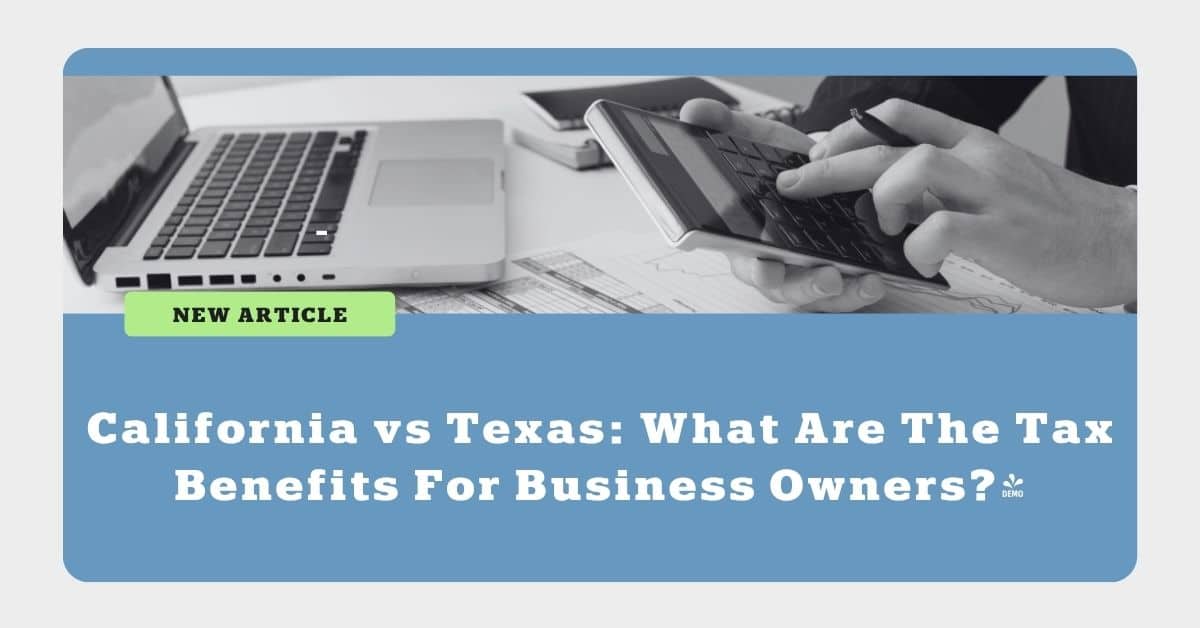
Thinking about where to base your business?
California and Texas are two of the most talked-about states when it comes to tax differences. If you’re a small business owner, contractor, or agent working in real estate or insurance, understanding how each state taxes you can make a real difference to what you keep at the end of the year.
Let’s walk through California versus Texas tax benefits and how the rules actually work, so you can see which state’s approach fits your situation.
In California, taxes tend to come at you from a few different angles. If you operate as a C corporation, the state levies a flat 8.84% tax on net income. Even if you choose an S corporation, which normally lets profits pass through to your personal return, California still imposes a 1.5% tax on that income, plus an $800 minimum tax. LLCs also pay at least $800 per year, and as their gross income rises, so do the franchise fees. Then on top of that, your share of business profits gets taxed at your personal state income tax rate, which climbs as high as 12% for top earners. In other words, you might pay a business-level tax and a personal tax on the same earnings.
Texas looks simpler at first glance. There’s no state corporate income tax and no personal state income tax. Instead, the state collects a franchise tax on most entities, but it’s structured so that many small businesses pay nothing at all. For 2024 and 2025, if your total revenue is under about $2.47 million, you owe no franchise tax. If you’re over that, you’ll generally pay a low rate of about 0.33% on gross receipts apportioned to Texas. For a lot of small firms, that’s still far less than California’s combined taxes.
Taxes on your own pay and on your employees also change between the two states. In California, employers have to deal with State Disability Insurance (SDI) deductions from employees’ paychecks, higher unemployment tax rates for new employers, and various assessments that add to payroll costs.
Texas doesn’t have a state income tax, so you won’t withhold that, and there’s no SDI. Your obligations there are mostly federal payroll taxes plus any local requirements like workers’ comp.
One thing to remember: if you have staff physically working in California, even if your company is based in Texas, California’s payroll rules still apply to those employees.
Even if you’re focused on income tax, don’t overlook what you’ll pay on goods, property, and equipment. California’s base state sales tax is 7.25%, and local add-ons can push the rate above 9 or 10%.
Texas starts at 6.25% and tops out at 8.25% when local taxes are included. If you’re buying a lot of materials or selling taxable goods, that difference adds up quickly.
Property taxes work differently, too. Texas has no state property tax but allows counties and cities to tax both real property and business personal property, like equipment and vehicles.
California’s property tax rate is often around 0.7 to 1%, but real estate prices are high. Proposition 13 limits how fast assessments can rise, which gives some stability. Where you locate your assets can meaningfully change your tax bill.
If you run a plumbing or HVAC company, for example, the Texas setup could mean significant savings. A plumbing LLC making $1.2 million in revenue might face California’s personal state income tax plus an entity-level tax, but in Texas it could be under the franchise tax threshold and pay nothing at the state level. You’d still have to handle local property taxes on your trucks and equipment, but your net after tax would likely be higher.
Real estate agents and insurance brokers often earn pass-through income. In California, your commissions are taxed at the state’s personal income tax rates. In Texas, those same commissions aren’t taxed at all by the state. However, if you’re still earning income sourced to California properties or clients, California will expect its share, regardless of where your business is registered.
For hybrid operations, say a Texas firm serving California customers, you’ll need to apportion income between states and comply with both sets of rules. California is aggressive about asserting “nexus” if you have a presence, property, or significant sales there, so good records and proper filings are essential.
There isn’t a one-size-fits-all answer to whether California or Texas is better for business owners. Texas often delivers a clear tax advantage for small firms whose operations are mostly in-state and under the franchise threshold. But if your clients, staff, or assets are in California, or if your margins are slim, the benefits may shrink once you factor in compliance and relocation costs.
If you’re unsure, that’s what accountants like us are here for. We can run the numbers on your specific situation and show you how much you’d really save by moving or restructuring. That way, you can make a decision based on real data, rather than headlines.